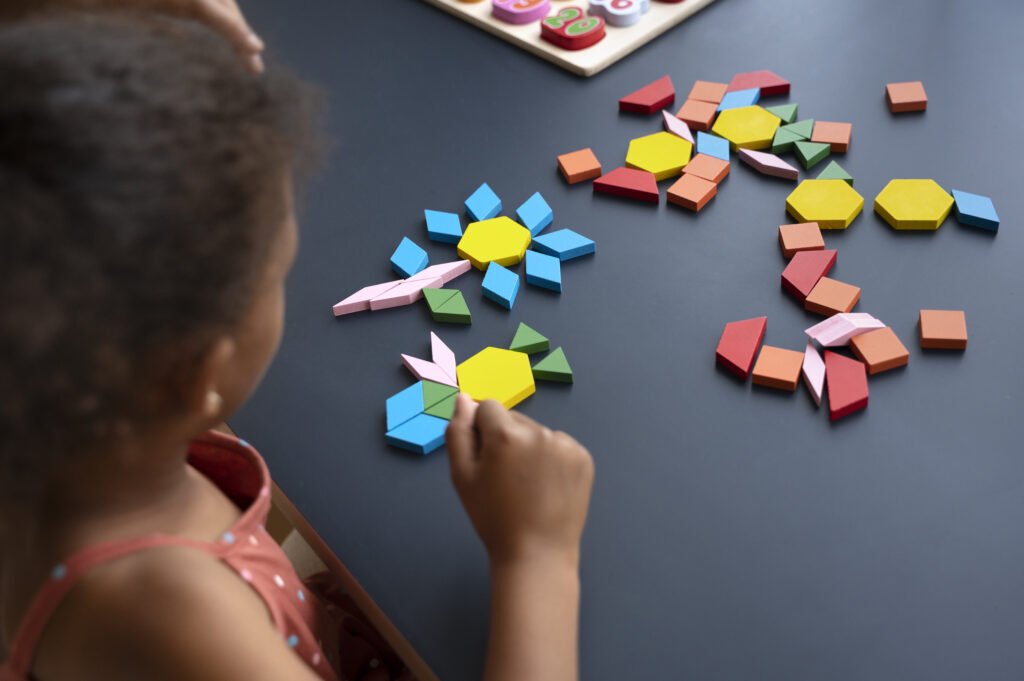Understanding your child’s cognitive development is very important to nurture his or her growth and to be able to intervene early on when something goes wrong. Cognitive development refers to how children think, explore, and figure things out. It includes skills like memory, problem-solving, and understanding and interacting with the world. We will explore the details of early cognitive development milestones from infancy through early childhood, so parents will know what to expect at each stage.
Cognitive Development in Infants (0-12 months)
This is the period of rapid cognitive development when an infant begins to make sense of the world around him.
0-3 Months:
Attention and Attraction: Newborns are attracted to human faces and can follow objects with their eyes by the end of the third month. They also recognize familiar voices, such as those belonging to their parents, and their preferences.
4-6 months:
Object Explorations: Infants would get more exploratory, look to touch or grasp, and put objects into their mouths to touch them. They begin to understand that through actions, outcomes may be derived, like the shaking of a rattle generates noise.
7-12 months:
Object Permanence: Around 9 months, babies develop object permanence, the idea that objects still exist even when they are out of sight, a fact well illustrated in games like peek-a-boo.
Imitation: Infants start imitating simple actions and sounds, indicating early stages of learning by observation.
To understand cognitive and language developments at six months, refer to our comprehensive guide: From Rolling to Babbling: 6 Month Developmental Milestones.
Cognitive Development in Toddlers (1-3 Years)
Toddlerhood is a period of learning and exploration. During this stage, cognitive skills expand rapidly.
12-18 Months:
Problem Solving: Toddlers start solving problems, like figuring out how to get a container open or fit shapes in a shape sorter.
Symbolic Thinking: They begin with symbolic play by using a block as a telephone.
18-24 Months:
Language Explosion: A significant increase is seen in the vocabulary and ability to form simple sentences, which would help in developing cognitive and communication skills.
Pretend Play: The kind of play pretend is enriched further and turns into an imitation of real-life activities, such as cooking or driving.
2-3 Years:
Acquiring Skills Through Interaction: They learn basic concepts, such as counting their objects or primary color recognition, through interaction and play.
Following instructions: Two-step instructions begin to be followed, while simple storylines and narratives can be read.
Cognitive Development in Preschoolers (3-5 Years)
The preschool years witness the cognitive refinements in the child and stage him/her up for formal schooling.
3-4 years of age:
Memory and Recollection: These children remember things and recite them like incidents or tales.
Understand Time: Now, they would understand very minor concepts like mornings and nights. It also becomes familiar with event sequences.
4-5 years of age:
Logical Reasoning: Kids can solve more complex problems and understand cause-and-effect relationships more clearly.
Understanding Numbers and Letters: They learn to recognize numbers and letters, come to understand quantities, and even start counting and writing.
Tips for Facilitating Your Child’s Cognitive Development
Here are tips to promote cognitive development in your child at different ages:
- Interactive Play: Engage your child in interactive games and activities that require thought and problem-solving, like puzzles, building blocks, and memory games.
- Reading Together: Read books to your child regularly. Identify pictures, ask questions, and encourage your child to retell parts of the story.
- Exploration and Discovery: Provide your child with opportunities to explore. Examples include visits to the park, the museum, or going for nature walks. Encourage curiosity and ask questions.
- Consistency and Routine: Establish routines that help the child understand the concept of time and order. The routine also gives the child a sense of security.
- Encourage Pretend Play: Provide them with dress-up clothes, kitchen sets, etc., for pretend play, which helps develop symbolic thinking and social skills.
When to Seek Professional Help
Every child develops at their own pace, but if you observe significant delays or have concerns about your child’s cognitive development, consult with a pediatrician or child development specialist. Early intervention can provide the support needed to help your child achieve their full potential.
FDNA’s Family Health Checker app offers a practical solution for parents, allowing you to assess both developmental delays and potential genetic concerns in the comfort of your home. Powered by advanced and secure AI, the app evaluates your child’s progress across key developmental areas and helps identify potential health concerns. Early diagnosis and intervention are important because many developmental delays may be linked to genetic factors. Parents receive a free report and have the option to connect with healthcare professionals for further evaluation and a no-cost genetic test for eligible children. AI tools may enhance the efficiency of the diagnostic process, but seeking a healthcare professional for a formal diagnosis and individualized guidance remains essential.



